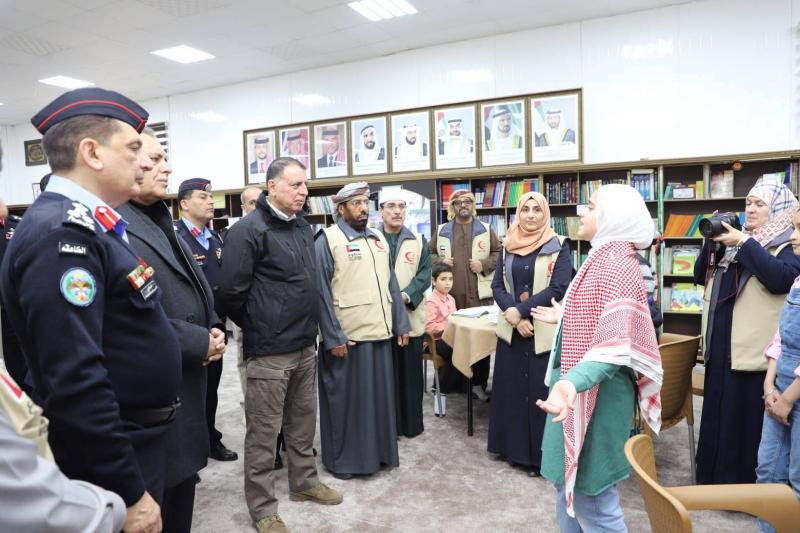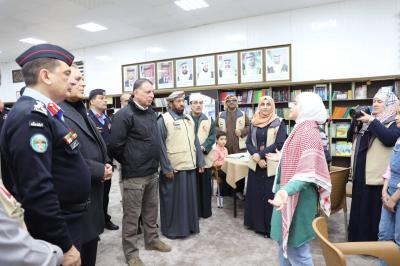Jordanian Interior Minister Mazen Al-Fraihah affirmed that Jordan has never been, and will never be, a place for resettling Syrian refugees. During a visit to the Azraq and Emirati Jordanian camps on Monday, he noted that Jordan continues to host and care for around 1.3 million Syrian refugees, despite the declining international response to the needs of these refugees, which was only 30 percent last year. This low response exerts pressure on Jordan’s limited resources and affects the quantity and quality of services available to refugees.
During his visit to the Azraq camp, which hosts approximately 44,000 Syrian refugees, and in meetings with representatives from several supporting and donating international organizations, he emphasized the necessity of increasing and sustaining aid to enable Jordan to fulfill its humanitarian duty towards the Syrian refugees and to ensure that various international crises do not divert attention from the needs of these refugees.
He appreciated the significant role played by these organizations and donor countries in maintaining support despite the rapid global events, such as the war in Ukraine and the aggression faced by the people in Gaza from the Israeli occupation. The visit is part of the government’s work plan to monitor the conditions of Syrian refugees in Jordan from all aspects and assess their living conditions, especially during the winter.
In discussions with members of the local security council in the camp, recently formed with the participation of local community members among the refugees in Azraq, he stressed the importance of Syrian refugees keeping in mind that Syria is their homeland and instilling this belief in their children, so Syria remains in their hearts until they can return.
He mentioned that since the start of the Syrian refugee crisis in Jordan in 2011, more than 215,000 children have been born to refugee families in Jordan, which could lead to psychological issues for this group in the future due to their distance from their homeland.
Al-Fraihah expressed gratitude to the international organizations and donor countries that have provided ongoing support to Jordan to fulfill this humanitarian obligation, highlighting that Jordan is one of the largest host countries for refugees, despite being located in a region of intense political unrest. He stated that the Jordanian political leadership, led by King Abdullah II, is making great efforts to achieve security stability in Syria and other neighboring countries, necessitating that major world countries also work to end these disturbances to restore peace and security for all peoples in the region and enable Syrian refugees to return home soon.
The camp director and several local security council members presented an overview of the general conditions in the camp and what has been accomplished in serving refugees in various areas recently. Representatives of international organizations operating in the camp confirmed their ongoing efforts to ensure the provision of essential services to refugees within available capacities, while praising the role of the Jordanian government in facilitating their work.
In a related context, Al-Fraihah visited the Emirati Jordanian camp in Mrajeeb Al-Fuhud, meeting with the Emirati relief team managing the humanitarian operations there, accompanied by the camp director Colonel Munir Al-Shkhanbah. He praised the great humanitarian role played by the United Arab Emirates in serving Syrian refugees in Jordan, noting the deep Jordanian-Emirati relations and their shared goal of serving those in need and caring for refugees, with the Emirati Jordanian camp standing as a testament to the generosity of the Emirati people.
During the visit, he spoke with several Syrian refugees, reminding them to maintain their sense of belonging to their homeland, Syria, while assuring them that Jordan will remain a warm refuge for all Arab brothers. He mentioned that more than 120,000 Syrian refugees have visited Jordan to reunite with their families, as events in Syria caused their displacement and separation.
For his part, Hassan Salem Al-Qaydi, head of the Emirati relief team, outlined the UAE's experience in aiding and caring for Syrian refugees in Jordan since the establishment of the Emirati Jordanian camp in 2012, noting its subsequent expansions and the development of services at all levels. Currently, approximately 6,200 refugees in the camp enjoy health, educational, social services, and others at the highest standards.
He appreciated Jordan's role and efforts in facilitating the work of the UAE Red Crescent within the camp and its ongoing support for its administration to ensure the continuous provision of services smoothly and safely. Al-Fraihah toured the facilities of the Emirati Jordanian camp, reviewing the services provided and the psychological and social conditions of the refugees, many of whom expressed their gratitude to Jordan for providing a safe and honorable refuge after their hardships and dangers.




